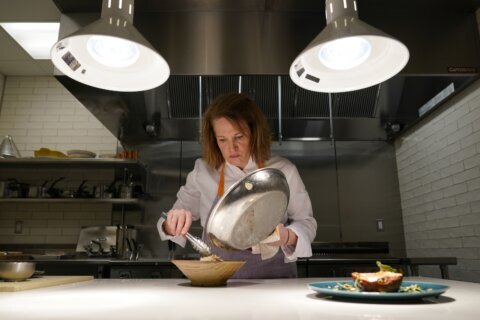Boost your culinary literacy: Get comfortable in the kitchen.
Along with his clinical and academic chops, Dr. David Eisenberg is at home in the kitchen. “I happen to be the son and grandson of professional bakers and chefs,” says Eisenberg, an internist, as well as the director of culinary nutrition and an adjunct associate professor of nutrition at the Harvard T. H. Chan School of Public Health. “I grew up cooking before I could ride a bike or throw a ball, and I’ve cooked every day of my life. It’s sort of in my DNA, and it’s my creative outlet.” Through the leadership conference Healthy Kitchens, Healthy Lives and the Teaching Kitchen Collaborative, he’s worked to boost other health professionals’ cooking skills and improve public health by boosting culinary literacy.
Put food in its proper place — it should be top of mind — when considering your health.
Food isn’t a cure-all replacement for medicine or medical procedures. It’s not one or the other. But too often, experts say, what we eat gets short shrift — being treated as a reactive afterthought, garnering a quick mention during a medical appointment or more serious treatment only after a health scare (which isn’t to say you shouldn’t take it to heart then, too). “If food is thought of as part of your medical treatment, that becomes crucial to your longevity, to your health, to your wellness,” says Dr. John Principe, an internist, self-trained chef and founder of WellBeingMD, an integrative, holistic medical practice based in Palos Park, Illinois, “and people start making it a priority.”
Find a teaching kitchen or cooking class near you.
Admittedly, in a fast-paced and fast food-oriented world, many people don’t know where to start with making food at home. Doctors routinely advise eating well and shedding pounds or maintaining a healthy weight for disease prevention and to manage chronic conditions. But most physicians receive precious little education on nutrition in medical school, and patients routinely lack cooking skills. That’s where, say experts who do have a combination of clinical and culinary experience, learning from others — seeing and doing — is key. To do just that, check out a local teaching kitchen or cooking class, or spend time with family or friends who are at home in the kitchen.
Don’t assume eating healthy is financially out of reach.
While unhealthy processed foods can be cheaper than whole foods, the cost difference to eat healthy is minimal, according to research from the Harvard School of Public Health — and most people can afford it. “A lot of what we spend time on at Healthy Kitchens, Healthy Lives is demonstrating and sharing recipes with people to showcase that you can easily feed a family of six for $20,” Eisenberg says. Chefs at the Culinary Institute of America provide hands-on instruction to health professionals on making healthy meals. You can make a roast chicken with healthy carbohydrates and vegetables, a big chili and salad dinner, or a great marina or tomato sauce with healthy pasta for $20, Eisenberg says.
Take stock of the homemade tomato sauce lesson.
You might think that making what you can buy premade is going to take forever or cost more. But while some packaged products might be cheap, often the real deal is less expensive — and it’s usually healthier, too. Take the example of tomato sauce for spaghetti. “If you look at any jar of tomato sauce on the shelf, it’s expensive relative to buying a can of tomatoes to which you add garlic, salt, pepper and some basil — and it’s also got tons more salt and sugar. It takes about 15 minutes to make a fantastic tomato sauce,” Eisenberg says. Add to that: “It’s less expensive. It’s healthier … and people realize it tastes better.”
Learn techniques, not just recipes.
Not sure how to make a great sauce? Don’t go straight for the cookbook. “It would be great if you could learn by technique, not by recipe,” Eisenberg says. Whether it’s in a cooking class, a teaching kitchen or buddying up with that cook extraordinaire you know, it’s ideal to learn techniques for how to make things like salad dressings and sauces, so that — with practice — you can make what you like, with personally palatable variations. “Any technique can be applied to dozens, if not hundreds, of recipes that will probably be much more attractive to you, given your ability to add the spices or fruits or nuts or vegetables or proteins you like,” Eisenberg says.
Make extra.
To save precious time and eat healthy meals during a busy week, prepare more than you need for a single meal on, say, Sunday, or another slow day. “Make extra prepped ingredients, like chopped onions, garlic or other items your family uses regularly,” says Dr. Michelle Hauser, an internist, chef and postdoctoral research fellow in cardiovascular disease prevention at Stanford University School of Medicine. “This saves a lot of time in prep and cleanup.” From sauces to soups to whole chickens to grains that take longer to cook, prepping or cooking in bulk, and storing the rest in the refrigerator or freezer until you need it, allows you to eat well, even on the go.
Mise en place — have everything in its place.
The French culinary phrase — that literally means “putting in place,” or essentially “everything in its place” — is a key concept that Principe feels translates well to cooking in any home. “If you’re going to make these meals at home, you really kind of have to plan ahead,” he says. “You have to do the appropriate shopping, and you have to have all of your ingredients at home.” What you don’t want to have happen is to plan to make a meal at home, find you don’t have an important ingredient, and then by default, end up ordering in or eating out, he says.
Develop your knife skills.
Make sure you have reliable kitchen knives on hand, and know how to use them. “Get a sharp chef’s knife and learn to chop produce,” says Hauser, who conducts prevention research and teaches nutrition and culinary medicine to medical students at Stanford. “This may be the single most useful suggestion that I can give. After teaching cooking to thousands of people over the years, this is the thing that most people identify … that helped them get into the kitchen and cook for themselves more.”
Ditch the false choice: overindulge or diet. Enjoy eating well.
A major benefit to cooking at home: You pay closer attention to what you eat, while making what you like. “We know that those who cook at home eat healthier than those who don’t,” Hauser notes. “When we see what is going into our food, it matters to our health.” It also helps one get away from an all-or-nothing — eat junk or deprive yourself — mentality. By making healthy, delicious meals, you can set aside that false choice. “It’s not either overindulge on decadent things that will kill you early or go on a diet and feel constrained for the rest of your life,” Eisenberg emphasizes. “The middle ground can be very liberating and very wonderful.”
More from U.S. News
Fresh Fish Shouldn’t Stink, and Other Rules of Thumb
How to Make Healthful Dietary Changes Last a Lifetime
How to Cook With Collard Greens
9 Meal Tips From Doctors Who Are Also Experts in the Kitchen originally appeared on usnews.com







